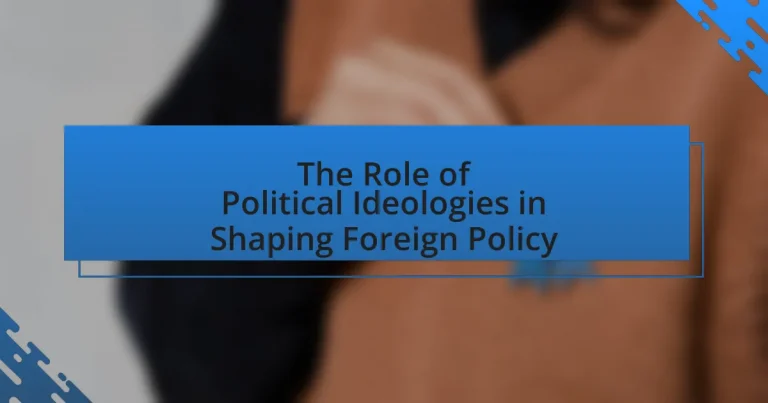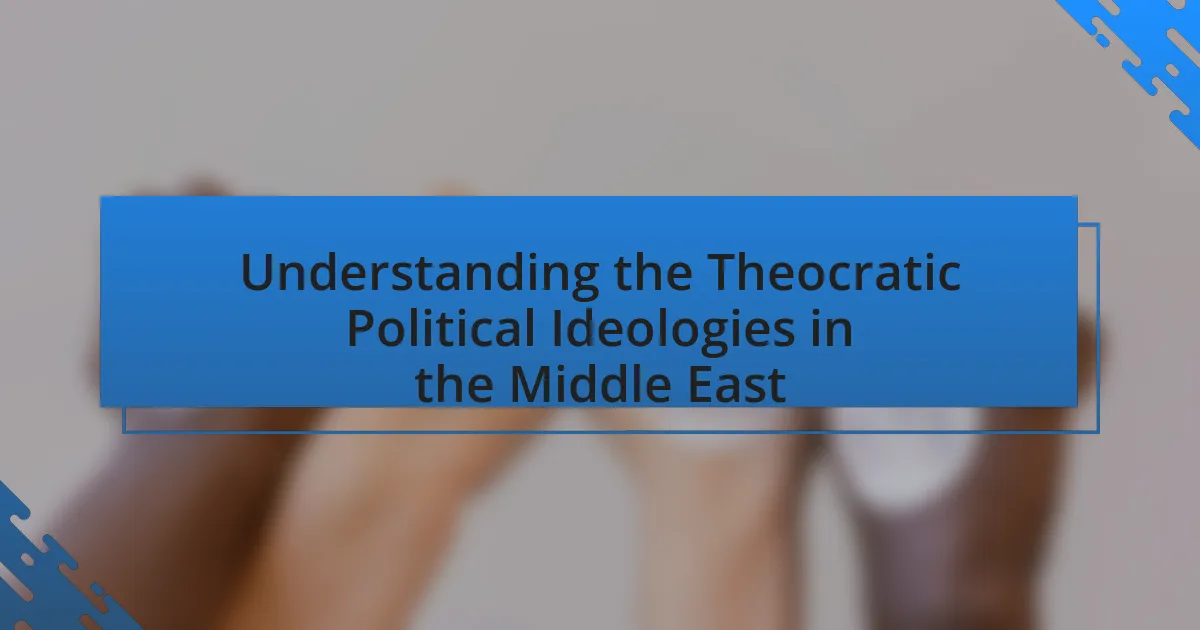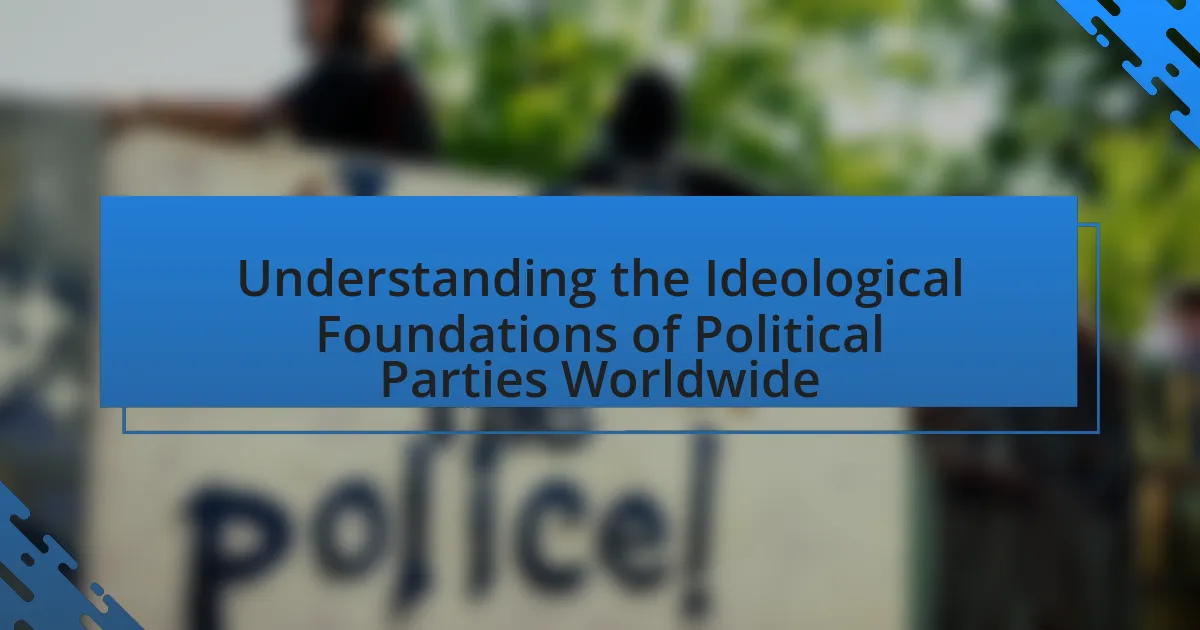The article examines the significant role of political ideologies in shaping foreign policy, highlighting how these ideologies influence the values, priorities, and strategies adopted by governments in their international relations. It discusses key ideologies such as realism, liberalism, constructivism, and Marxism, and their impact on foreign policy decisions, national interests, and international cooperation. The article also explores how historical contexts and contemporary issues reflect ideological divides, affecting diplomatic negotiations and alliances. Understanding these ideological frameworks is essential for analyzing foreign policy outcomes and improving diplomatic relations.
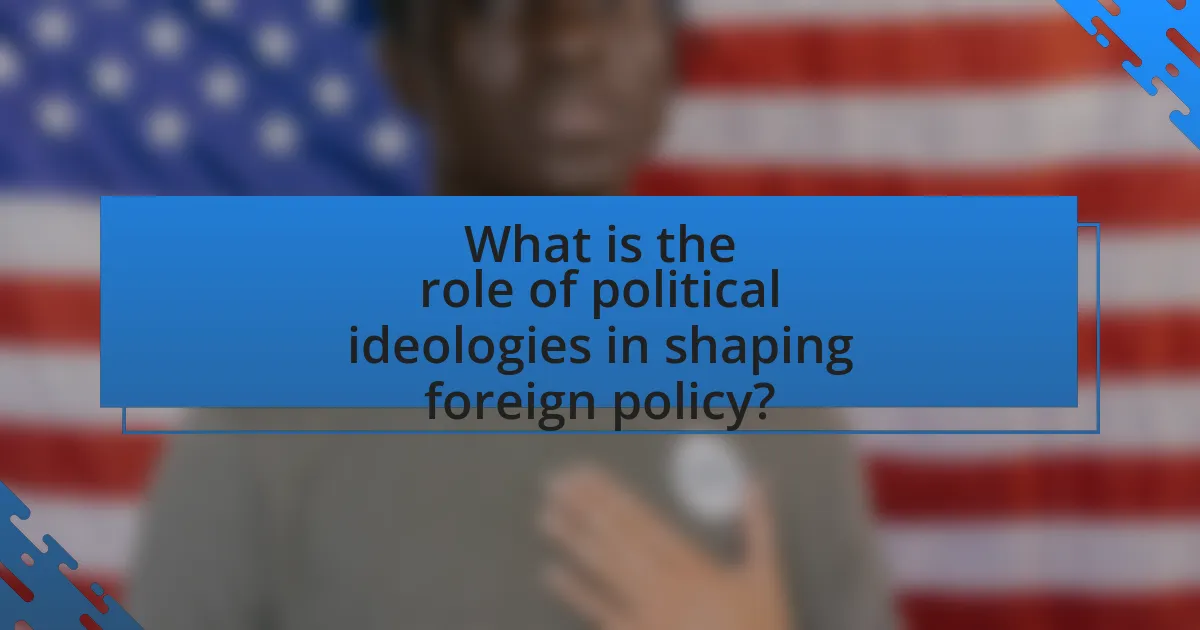
What is the role of political ideologies in shaping foreign policy?
Political ideologies play a crucial role in shaping foreign policy by influencing the values, priorities, and strategies that governments adopt in their international relations. For instance, a government guided by liberal ideology may prioritize diplomacy, human rights, and multilateralism, as seen in the foreign policies of countries like Canada and the Scandinavian nations, which emphasize international cooperation and humanitarian efforts. Conversely, a government with a realist ideology may focus on national interests and power dynamics, often leading to more aggressive stances, as evidenced by the foreign policy of the United States during the Cold War, which prioritized containment of communism. These ideological frameworks not only dictate the approach to international conflicts and alliances but also affect domestic public opinion and the political discourse surrounding foreign policy decisions.
How do different political ideologies influence foreign policy decisions?
Different political ideologies significantly influence foreign policy decisions by shaping the priorities, strategies, and actions of states. For instance, liberal ideologies often promote diplomacy, international cooperation, and multilateralism, as seen in the establishment of the United Nations and various international treaties aimed at fostering peace and security. In contrast, realist ideologies prioritize national interest and power, leading to policies focused on military strength and strategic alliances, exemplified by the Cold War dynamics between the United States and the Soviet Union. Additionally, socialist ideologies may advocate for anti-imperialist stances and support for global social justice, influencing foreign aid and trade policies. These ideological frameworks guide decision-makers in assessing threats, opportunities, and the moral imperatives of their actions on the global stage.
What are the key political ideologies that impact foreign policy?
Key political ideologies that impact foreign policy include realism, liberalism, constructivism, and Marxism. Realism emphasizes national interest and power, often leading to pragmatic and sometimes aggressive foreign policies, as seen in the Cold War strategies of the United States and the Soviet Union. Liberalism focuses on cooperation, international institutions, and the promotion of democracy and human rights, influencing policies such as the establishment of the United Nations and NATO. Constructivism highlights the role of ideas, identities, and norms in shaping state behavior, which can be observed in the evolving attitudes towards climate change and global governance. Marxism critiques capitalism and advocates for the interests of the working class, impacting foreign policy through anti-imperialist movements and support for socialist regimes during the 20th century. Each ideology provides a distinct framework that shapes how states interact on the global stage.
How do political ideologies affect national interests in foreign policy?
Political ideologies significantly shape national interests in foreign policy by influencing the priorities and strategies that governments adopt. For instance, a liberal ideology may prioritize human rights and international cooperation, leading to policies that support multilateral agreements and humanitarian interventions, as seen in the U.S. foreign policy during the Obama administration, which emphasized diplomacy and global partnerships. Conversely, a conservative ideology often emphasizes national sovereignty and military strength, resulting in policies that focus on unilateral actions and defense spending, exemplified by the U.S. foreign policy under the Trump administration, which prioritized “America First” and withdrew from several international agreements. These ideological frameworks dictate how nations perceive threats, engage with allies, and allocate resources, ultimately guiding their foreign policy decisions.
Why is understanding political ideologies important for foreign policy analysis?
Understanding political ideologies is crucial for foreign policy analysis because these ideologies shape the beliefs, values, and priorities of states, influencing their international behavior. For instance, a country governed by liberal ideology may prioritize diplomacy and multilateralism, while a nation with a realist perspective might focus on power and national interest. Historical examples, such as the contrasting foreign policies of the United States during the Cold War—where containment of communism was driven by ideological beliefs—demonstrate how ideologies dictate strategic choices. Thus, analyzing political ideologies allows analysts to predict and interpret state actions on the global stage effectively.
How can political ideologies predict foreign policy outcomes?
Political ideologies can predict foreign policy outcomes by shaping the values and priorities that guide decision-making processes. For instance, a government with a liberal ideology may prioritize diplomacy and international cooperation, leading to policies that favor multilateral agreements, such as the Paris Agreement on climate change. Conversely, a government with a conservative ideology might emphasize national sovereignty and military strength, resulting in policies that focus on unilateral actions or military interventions, as seen in the U.S. invasion of Iraq in 2003 under a neoconservative framework. These ideological frameworks influence how states perceive threats, engage with allies, and respond to global challenges, thereby directly impacting foreign policy decisions.
What role do political ideologies play in international relations theory?
Political ideologies significantly shape international relations theory by influencing how states perceive their interests and interact with one another. For instance, liberalism emphasizes cooperation and international institutions, suggesting that states can achieve mutual benefits through diplomacy and trade, as seen in the establishment of the United Nations. Conversely, realism focuses on power dynamics and national interest, arguing that states act primarily to ensure their survival and dominance, which is evident in the behavior of states during the Cold War. These ideological frameworks guide policymakers in their decision-making processes, affecting alliances, conflicts, and diplomatic strategies.
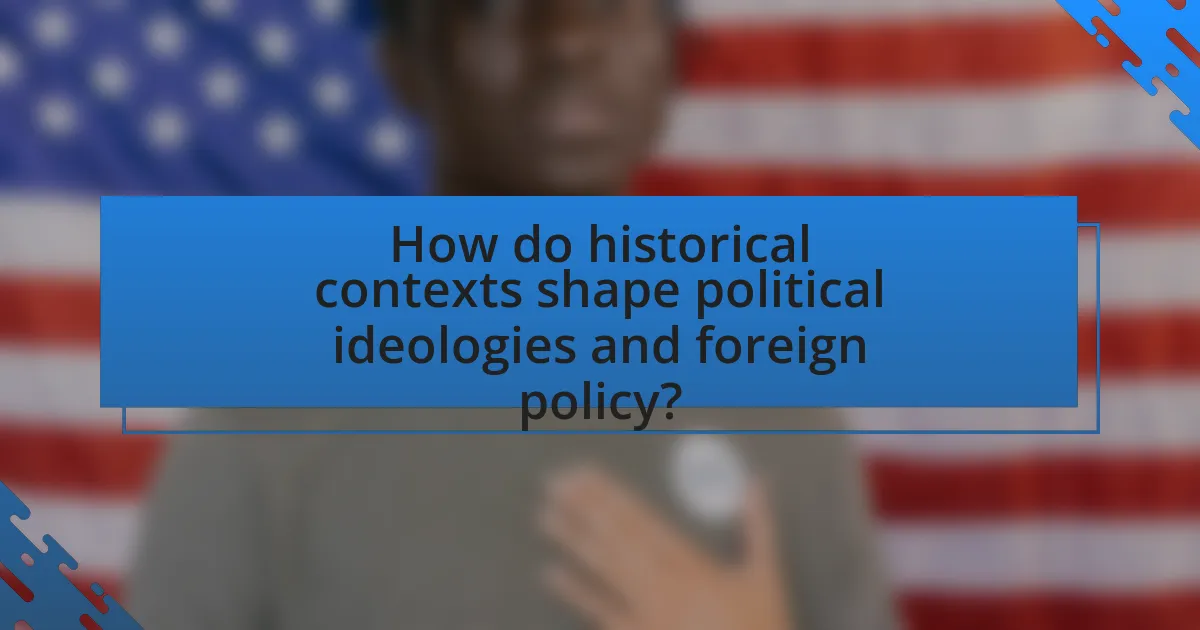
How do historical contexts shape political ideologies and foreign policy?
Historical contexts significantly shape political ideologies and foreign policy by influencing the values, beliefs, and priorities of societies. For instance, the aftermath of World War II led to the establishment of the United Nations and the promotion of liberal democratic ideals, which shaped the foreign policies of Western nations towards collective security and international cooperation. Additionally, the Cold War context fostered ideologies of containment and anti-communism, directly impacting U.S. foreign policy decisions, such as military interventions in Korea and Vietnam. These historical events illustrate how the specific circumstances of a time period can dictate the prevailing political ideologies and the corresponding foreign policy actions taken by nations.
What historical events have significantly influenced political ideologies?
The Enlightenment, the French Revolution, and the World Wars are historical events that have significantly influenced political ideologies. The Enlightenment introduced ideas of individual rights and rational governance, shaping liberalism. The French Revolution (1789) established principles of democracy and nationalism, leading to the rise of republicanism and socialism. The World Wars, particularly World War I and II, prompted the emergence of ideologies such as fascism, communism, and the re-evaluation of capitalism, as nations sought to address the failures that led to global conflict. These events collectively transformed political thought and governance structures worldwide.
How did the Cold War shape ideological perspectives on foreign policy?
The Cold War significantly shaped ideological perspectives on foreign policy by polarizing global politics into capitalist and communist blocs. This division led to the United States adopting a policy of containment to prevent the spread of communism, as articulated in the Truman Doctrine of 1947, which asserted that the U.S. would support nations resisting subjugation by armed minorities or outside pressures. Conversely, the Soviet Union promoted the spread of communism as a counter to Western imperialism, influencing its foreign policy decisions, such as the support for communist movements in Asia, Africa, and Latin America. The ideological rivalry fostered a climate of mistrust and competition, exemplified by events like the Cuban Missile Crisis in 1962, which underscored the lengths to which both superpowers would go to assert their ideological dominance. Thus, the Cold War fundamentally redefined foreign policy strategies, prioritizing ideological alignment over traditional diplomatic relations.
What lessons can be learned from past ideological conflicts in foreign policy?
Lessons learned from past ideological conflicts in foreign policy include the importance of understanding the motivations behind different ideologies, the necessity of diplomacy over military intervention, and the recognition of unintended consequences. Historical examples, such as the Cold War, illustrate that ideological clashes can lead to prolonged tensions and conflicts, emphasizing the need for dialogue and negotiation to resolve differences. Additionally, the Vietnam War demonstrates that military solutions often fail to achieve ideological goals and can result in significant loss of life and resources. These lessons highlight the critical role that political ideologies play in shaping foreign policy decisions and the need for careful consideration of their implications.
How do contemporary issues reflect the influence of political ideologies on foreign policy?
Contemporary issues reflect the influence of political ideologies on foreign policy by shaping national priorities and strategies in response to global challenges. For instance, the rise of populism in various countries has led to a shift towards isolationist policies, as seen in the United States under the Trump administration, which prioritized “America First” over multilateral agreements. This ideological stance resulted in the withdrawal from the Paris Agreement and the renegotiation of trade deals, demonstrating how populist ideology directly influenced foreign policy decisions. Additionally, the emphasis on human rights by liberal democracies has led to sanctions against authoritarian regimes, illustrating how ideological commitments can dictate responses to international crises.
What current global challenges are shaped by ideological divides?
Current global challenges shaped by ideological divides include the rise of populism, climate change responses, and geopolitical tensions. Populism has led to increased nationalism, affecting international cooperation on issues like trade and migration. Climate change responses are often hindered by ideological differences, as some nations prioritize economic growth over environmental regulations. Geopolitical tensions, particularly between democratic and authoritarian regimes, manifest in conflicts such as the U.S.-China rivalry, where differing ideologies influence military and economic strategies. These challenges illustrate how ideological divides impact global governance and collaborative efforts.
How do political ideologies inform responses to climate change in foreign policy?
Political ideologies significantly shape responses to climate change in foreign policy by influencing priorities, strategies, and international cooperation. For instance, left-leaning ideologies often advocate for aggressive climate action and multilateral agreements, as seen in the Paris Agreement, which emphasizes collective responsibility and global equity. In contrast, right-leaning ideologies may prioritize economic growth and national sovereignty, leading to skepticism about international climate commitments, exemplified by the withdrawal of the United States from the Paris Agreement under a conservative administration. This divergence illustrates how political beliefs dictate the extent to which nations engage with climate issues on the global stage, impacting both domestic policies and international relations.
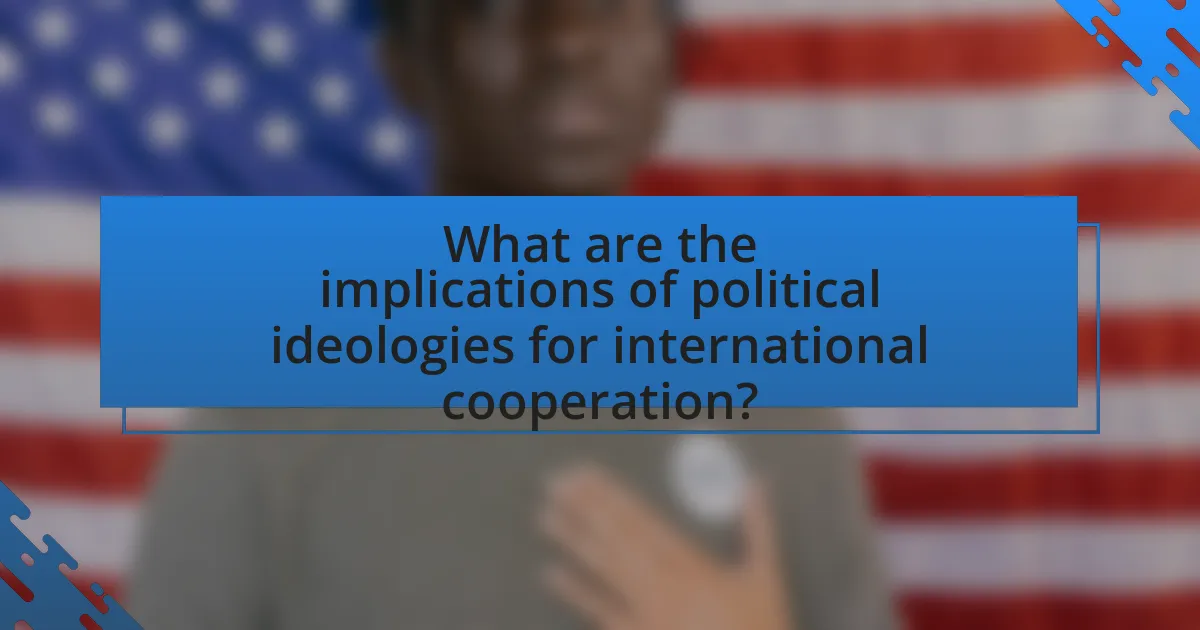
What are the implications of political ideologies for international cooperation?
Political ideologies significantly influence international cooperation by shaping the priorities and strategies of states. For instance, liberal ideologies often promote multilateralism and collective security, as seen in the establishment of international organizations like the United Nations, which aim to foster cooperation among nations. Conversely, nationalist ideologies may prioritize sovereignty and unilateral action, leading to isolationist policies that hinder collaborative efforts, as evidenced by the withdrawal of certain countries from international agreements like the Paris Climate Accord. Additionally, ideological divides, such as those between democratic and authoritarian regimes, can create barriers to cooperation, as seen during the Cold War when ideological conflicts severely limited diplomatic engagement. Thus, the implications of political ideologies for international cooperation are profound, affecting both the willingness and ability of states to collaborate on global issues.
How do political ideologies affect alliances and partnerships?
Political ideologies significantly influence alliances and partnerships by determining the values and goals that states prioritize in their foreign relations. For instance, liberal democracies often form alliances based on shared principles of democracy and human rights, as seen in organizations like NATO, where member states commit to collective defense and democratic governance. Conversely, authoritarian regimes may align with each other based on mutual interests in maintaining power and suppressing dissent, exemplified by partnerships like the Shanghai Cooperation Organization, which focuses on security and economic cooperation among member states with similar governance structures. These ideological alignments shape diplomatic strategies, influence military cooperation, and affect trade agreements, ultimately guiding the formation and sustainability of international partnerships.
What role do ideologies play in the formation of international organizations?
Ideologies significantly influence the formation of international organizations by shaping the values, goals, and operational frameworks of these entities. For instance, the establishment of the United Nations was driven by the ideological commitment to promote peace, security, and human rights following the devastation of World War II. This ideological foundation reflects a collective belief in multilateralism and cooperation among nations to prevent future conflicts. Additionally, organizations like the European Union emerged from a shared ideological commitment to economic integration and democratic governance, aiming to foster stability and prosperity in Europe. These examples illustrate how ideologies not only guide the creation of international organizations but also determine their priorities and functions in the global arena.
How can ideological differences hinder diplomatic negotiations?
Ideological differences can significantly hinder diplomatic negotiations by creating fundamental barriers to understanding and compromise. When parties hold opposing beliefs about governance, human rights, or international relations, these differences can lead to mistrust and miscommunication. For instance, during the Cold War, the ideological divide between capitalism and communism severely restricted dialogue between the United States and the Soviet Union, resulting in prolonged conflicts and missed opportunities for peaceful resolutions. Such ideological divides can also manifest in rigid stances, making it difficult for negotiators to find common ground or agree on mutually beneficial solutions.
What strategies can policymakers use to navigate ideological differences in foreign policy?
Policymakers can use dialogue, compromise, and coalition-building as strategies to navigate ideological differences in foreign policy. Engaging in open dialogue allows for the exploration of diverse perspectives, fostering mutual understanding and reducing tensions. Compromise enables policymakers to find common ground, facilitating agreements that respect differing ideologies while achieving shared goals. Coalition-building, as seen in international agreements like the Paris Climate Accord, demonstrates how aligning with like-minded nations can amplify influence and create a unified front despite ideological divides. These strategies are essential for effective governance in a complex global landscape.
How can understanding political ideologies improve diplomatic relations?
Understanding political ideologies can improve diplomatic relations by fostering mutual respect and facilitating effective communication between nations. When diplomats comprehend the underlying beliefs and values that drive a country’s policies, they can tailor their approaches to align with those ideologies, reducing misunderstandings and conflicts. For instance, recognizing that a nation prioritizes collectivism over individualism can guide diplomatic strategies that emphasize community welfare, thereby enhancing cooperation. Historical examples, such as the Cold War negotiations, illustrate that an awareness of ideological differences can lead to more constructive dialogues, as seen in the eventual arms reduction agreements between the United States and the Soviet Union, which were influenced by an understanding of each other’s political frameworks.
What best practices can be adopted for effective foreign policy formulation?
Effective foreign policy formulation can be achieved by adopting a comprehensive approach that includes stakeholder engagement, evidence-based decision-making, and adaptability to changing global dynamics. Engaging various stakeholders, including diplomats, experts, and civil society, ensures diverse perspectives are considered, which enhances policy relevance and acceptance. Evidence-based decision-making relies on accurate data and analysis, allowing policymakers to make informed choices that reflect current geopolitical realities. Additionally, adaptability is crucial, as foreign policy must respond to evolving international relations and domestic priorities, ensuring it remains effective and relevant. Historical examples, such as the U.S. foreign policy shift post-9/11, illustrate the importance of these practices in responding to new threats and opportunities.
